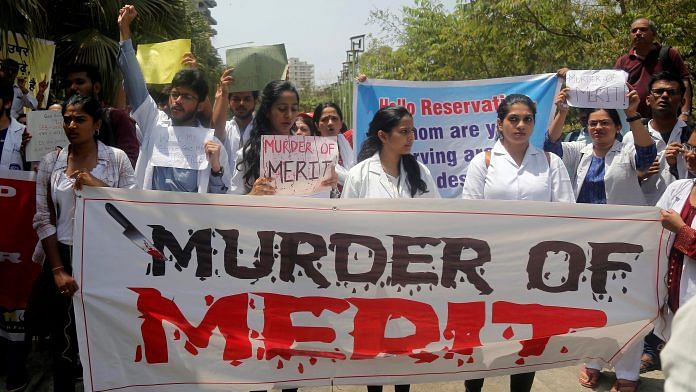The Supreme Court delivered a landmark judgment on 20 January explaining the reasons for upholding the permissibility of reservations and the constitutional validity of the OBC reservation in All-India Quota medical and dental UG and PG seats.
Authored by Justice D.Y. Chandrachud and Justice A.S. Bopanna, the judgment has set the record straight on the importance of reservations for socially backward groups. It has authoritatively demolished the myths and biased perceptions against reservations, especially in the medical profession, and has reimagined the discourse on ‘merit’, social privilege and cultural networks.
The arguments made before the Supreme Court against reservations in All-India Quota (AIQ) medical seats were similar to the drawing-room arguments often made by dominant castes. These included: once a person is qualified as a doctor, they cease to be backward and cannot avail further reservation; and that in PG and super-speciality courses, a candidate is required to possess a high degree of skill and expert knowledge, which candidates from reserved candidates won’t have, and therefore the most meritorious deserve the seat. The Supreme Court rejected these arguments as “a binary”, which does not consider the social realities and constitutional vision.
Also read: Article 16(4) stands on its own. Constitution made no room for ‘merit’ that courts invoke
Backwardness doesn’t go away with degree
The Court held that “the impact of backwardness” simply does not disappear “because a candidate has a graduate qualification”. It rightly pointed out that a graduate qualification “by itself does not create parity between forward classes and backward classes”. This parity can be because of several reasons, such as continuing discrimination against backward classes, overall wealth gap, etc.
The Court went to the root of the problem, that is, how widespread inequalities benefit the dominant castes in so many ways in their everyday life. “The privileges that accrue to forward classes are not limited to having access to quality schooling and access to tutorials and coaching centres to prepare for a competitive examination but also includes their social networks and cultural capital (communication skills, accent, books or academic accomplishments) that they inherit from their family… Social networks (based on community linkages) become useful when individuals seek guidance and advise on how to prepare for examination and advance in their career even if their immediate family does not have the necessary exposure,” the Court noted.
Such privileges act to the exclusion of the oppressed castes. A student from oppressed castes would not have the cultural capital, and would be at an automatic-and-systemic disadvantage. The Supreme Court was conscious to note this fact, as it held that the problem of inequality is about structural barriers. Even if a family from an oppressed caste may have progressed a bit economically, their children will still not have the same cultural capital or privileges enjoyed by the dominant castes. Such disadvantages become severe in professions that are based on social networks, such as legal, higher judiciary, business, journalism, etc. This is the reason one finds negligible representation in these professions.
Also read: There are glaring flaws in SC judgment excluding SC/ST creamy layer from reservations
Resetting ‘merit’ parameters
In the same vein, the Court said that the claims of “individual merit” or “meritocracy” have been used in Indian society as a medium of “reaffirming social hierarchies” and “are nothing but tools of obscuring inheritances that underlie achievements”. This is because “merit” is not solely of “one’s own making”. The Court rightly held thus: “The exclusionary standard of merit serves to denigrate the dignity of those who face barriers in their advancement”.
The judgment has also reset the parameters on which “merit” must be assessed. For quite long, performance/marks in competitive exams have been used to declare merit. However, the Court has called for an overall reconceptualization of merit. It stated: “[If] a high-scoring candidate does not use their talents to perform good actions, it would be difficult to call them “meritorious” merely because they scored high marks. The propriety of actions and dedication to public service should also be seen as markers of merit, which cannot be assessed in a competitive examination.”
As reservation ensures opportunities for socially backward groups, they facilitate an inclusive system and act as a counter to the hegemony of the dominant castes. Dr B.R. Ambedkar had once referred to reservations as “checks and balances which every Constitution must have, if democracy is not to be overwhelmed by the enemies of democracy”. Similarly, the Supreme Court held: “If open examinations present equality of opportunity to candidates to compete, reservations ensure that the opportunities are distributed in such a way that backward classes are equally able to benefit from such opportunities… This is the only manner in which merit can be a democratizing force that equalises inherited disadvantages and privileges.”
The Bench has also made an important clarification that the Supreme Court never held before – that reservations in medical PG courses are impermissible. This provides constitutional legitimacy to the similar claims of socially oppressed groups in demanding due representation in the so-called “institutions of eminence”, which have been hiding behind the notion of an exclusionary “merit” to deny space to these groups.
Anurag Bhaskar is an assistant professor at OP Jindal Global University and an affiliate faculty at the Harvard Law School Center on the Legal Profession. He tweets at @anurag_bhaskar_. Views are personal.
(Edited by Prashant)



